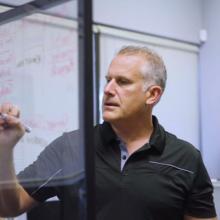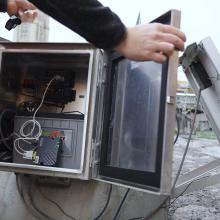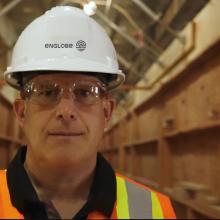Image set

Related services
Related regions
Opening article section
Article section
Rich text
Challenge accepted.
Eric ‘the wizard’ Gagné, Technical Director of Instrumentation, has learned that complicated problems do not always need complicated solutions.
Officially, on his resume and in the staff directory, Eric Gagné is Englobe’s Technical Director of Instrumentation, responsible for managing the largest seismograph rental fleet in Canada. But, to those who know him, he’s ‘the wizard’, the ‘go-to’ person you can rely on to help solve any challenge.
When asked how he earned a reputation for being the ultimate problem solver, Eric believes that it’s all in his approach. Being someone who finds just as much pleasure in working through a challenge as he does in finding a solution, he explains that choosing the right attitude and enjoying the process is what counts. He also notes that loving a good challenge, and having a knack for finding simple solutions, are important skills for anyone interested in a career in geotechnical instrumentation and monitoring.
We had the chance to chat with Eric ‘the wizard’ Gagné to learn more about how his passion for problem solving has informed his one-of-a-kind approach to leadership.
Rich text
Q. What is an area of leadership that you most passionate about?
The most fulfilling part of my job is being able to share my knowledge and experience with others on my team, and watching them learn, develop, and grow. As a mentor, I really enjoy working with staff to help them enhance their skills, to make better decisions, and to gain the confidence needed to work independently.
With geotechnical Instrumentation anyone can read the instruction manual and go set-up the equipment. The challenge is that our clients are looking for innovative solutions because the reality is that every project presents unique parameters and a one-size-fits all solution doesn’t work. The answers to instrumentation and monitoring problems are not taught in school, they are learned through experience – through seeing, listening, and doing.
I think leadership is less about managing people, and more about empowering people. Learning what everyone’s skillset are, challenging them to improve, and creating a safe work environment where they can be independent, make informed decisions, and believe in their own abilities.
Media
Image set

Rich text
Q. What currently motivates you?
I really find what motivates me most is knowing that when I come to work in the morning there will be a new set of challenges, big and small, waiting for me. For some, this would be a source of anxiety, but to me it’s pure excitement – its ok challenge accepted, every day, let’s go!
In my 28-year career I have traveled extensively and worked on major high-profile projects. This experience really taught me a lot about myself and that I thrive under pressure and perform best when I am outside of my comfort zone. It is within this space where I can take a deep breath, step-back and take a full assessment of the situation before digging-in.
I am deeply motivated by my colleagues and together we often welcome the task of finding new solutions to old problems. This never feels like a chore or like work. It’s more a matter of me being exactly where I need to be to do my best work: surrounded by a diverse and talented team, working on interesting projects.
Rich text
Q. What is the #1 misconception about instrumentation and monitoring in the industry?
I would say that the biggest misconception in this industry is that it’s simple: you read the manual for the monitoring technology and head out to site to set it up. The reality is that it is far more complicated and there is a lot of education that goes along with this type of specialized service.
It’s not taught in school, but as you work on projects, use the technology, and talk with clients about their specific needs, you learn that very few projects are cookie-cutter. In nearly every case, there is the need to be creative and an opportunity to problem solve. For example, it used to be standard to set-up instrumentation on site equipped with a 12-volt battery that a technician would need to change every 2-3 weeks. As an alternative solution, I came up with the idea of equipping instrumentation with solar panels that charge the batteries. With this simple innovation we only need to attend to the instrumentation for calibration or when the project is complete, and it’s a complete win-win. Again, this comes full circle to problem solving!
Every project gives us an opportunity to learn, and to rethink, or I would even say challenge, traditional approaches, or assumptions. What I absolutely love the most is when someone on my team brings a new perspective or idea to the table that allows us to view the project in a new way. This is not easy, in fact it takes a lot of courage, but it’s what is needed to push the boundaries and really advance this industry.
Media
Image set

Rich text
Q. What advice would you have for students interested in a career in instrumentation and monitoring?
I would say check the Englobe website to see if we are hiring! But seriously, geotechnical instrumentation and monitoring is not a course that they teach in school, but it plays an important role in major construction and civil engineering projects. In my experience, individuals who thrive in this area don’t join Englobe with instrumentation experience, but what they do have is a thirst for learning. I think what’s important is to be curious and to have the ability to learn independently.
There is absolutely a team aspect, and I work very closely with a diverse group, but having the confidence to take ownership of your project and work independently is important.
Rich text
Q. What is the final word you would like to leave on leadership?
Accept the challenge - period. Whether you are just starting out after graduating or are a veteran in your field, be open to trying something new even if it makes you feel uncomfortable. Challenges are what help us grow, and they are how we learn. If we lean into challenges and approach them positively looking for what makes them exciting or interesting, there is a real opportunity that you will come up with a solution that works. And, at the very least, you had fun and learned something new.
Eric’s Picks! As a self-proclaimed adrenaline junky with a penchant for a challenge, it’s probably not a surprise that Eric spends little time sitting in front of the TV. So, Eric doesn’t have a show, book, or podcast that he’d recommend, but he does strongly advise going outside for fresh air or a bike ride! He assures us that you will not regret it.